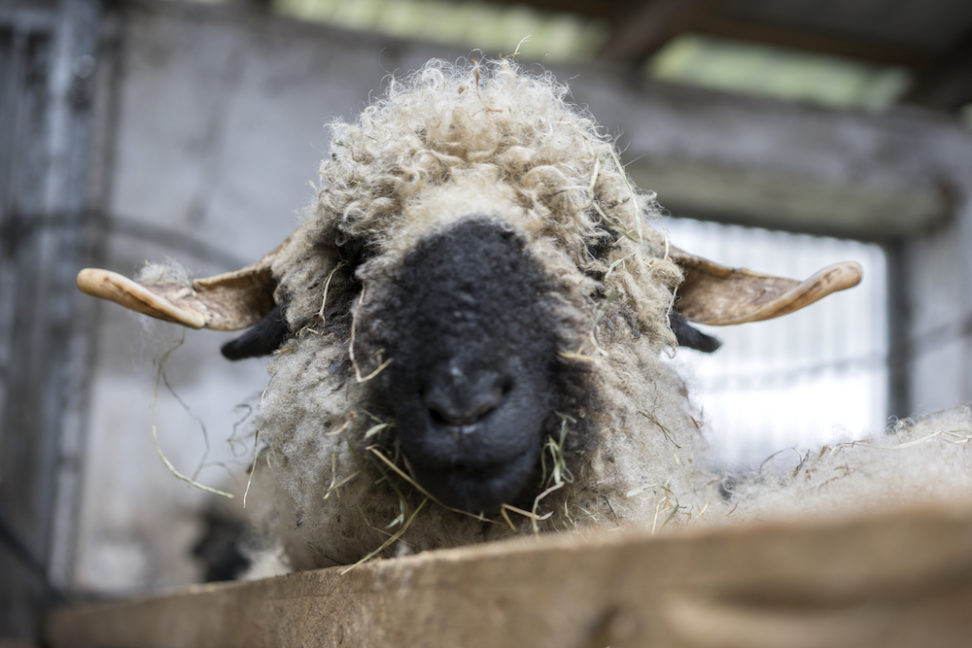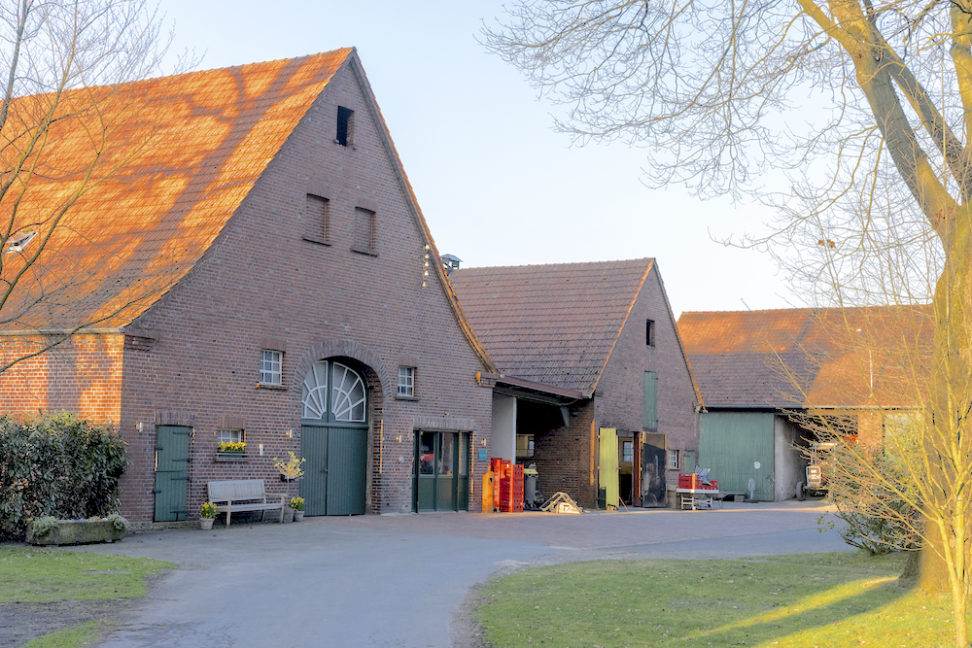by Robert B. Fishman
Necessity is the mother of invention. Farmers hardly get adequate prices for their food from retailers: the costs rise, the income stagnates or falls. In addition, there are stricter requirements for the environment and animal welfare. In 1950 there were 1,6 million farms in Germany. In 2018 there were around 267.000. In the last ten years alone, every third dairy farmer has given up. It mainly affects the little ones. If you want to survive in the price war on the world market, you have to produce even more cheaply, although nature and the environment fall by the wayside. That is why more and more farmers are selling their products directly to consumers. The Internet helps them with this. At weekly market 24, customers order online. In the evening, the producers' cooperative delivers the products to your doorstep.
Behind a warehouse in a Bielefeld industrial park, an electric delivery van buzzes around the corner. In a matter of seconds he leaves his diesel-powered colleagues behind. The cooperative Wochenmarkt 24 eG delivers groceries directly from farms with electric street scooter delivery vans. Orders are placed online.
food on wheels
“The Post now sells second-hand street scooters for an average of 18.000 euros,” says Eike Claudius Kramer, executive board member of Wochenmarkt24. “We struck.” A winner's smile flits across the narrow face of the otherwise rather deliberate 35-year-old. The cooperative is currently building a solar power system on the roof of its new logistics hall. During the day, this charges the cars that are used to drive out the food at night: every day except Sundays, the drivers in Bielefeld and the surrounding area deliver food parcels to around 800 households with an average value of 40 euros. The shop is booming. It's been booming since the beginning of the corona pandemic.
In 2018, farmers, restaurant operators and some small processors in East Westphalia joined forces to form the weekly market 24 cooperative. This jointly offers their products directly to end consumers on www.wochenmarkt24.de. A logistics company picks up the goods from the yards and brings them to the logistics hall. This is where employees put together the goods packages for customers. Anyone who has ordered online by 18 p.m. on weekdays and by 14 p.m. on Saturdays will receive their filled thermobox in front of the door the following night. It is still difficult for the residents of the city center. The delivery drivers don't ring the bell at night and they don't put the goods on the sidewalk either. The packages can be stolen or damaged here.
"We are working on a solution," promises Eike-Claudius Kramer. Customers in the city should soon be able to pick up their parcels in neighboring shops.
The choice: fresh fruit, vegetables, meat, milk, eggs, cheese, baked goods, fish, spreads, jams and even ready-made dishes from local restaurants, from simple spaghetti to Ethiopian chickpea wot (a kind of stew) to unusual desserts.
Sheep with personal accompaniment
You can order the delicacies online via Wochenmarkt24.de directly from the affiliated farmers and processors in the region. For example at the Wildhandel transmitter in Verl near Gütersloh:

Stephen Graute raises sheep and old breeds of pigs. He does not find any buyers for it in the trade. The quantities are too small and the meat does not meet the norms. You need “reasonable bacon” to go with your lean game meat. He only gets it from the pigs of the old breeds. But these animals grow more slowly. That makes the meat more expensive.
In return, the farmer offers his sheep and pigs a species-appropriate life. The farmer with the calm, low voice sees himself as an idealist. He accompanies his animals "with heart and soul from birth until their path is over with us". He becomes thoughtful. "If we want to eat meat, we also have to deal with the fact that everything has a beginning and everything has an end." Graute brings his animals to the butcher in the vicinity himself.
His black-nosed sheep in the Valais have no idea of this yet. They like to be caressed over their black heads. During the day they graze outside on the pastures of the flat Senne landscape. Graute has converted a discarded golf caddy with which he brings them water and food.
Graute can only work in such a animal welfare-friendly manner because he markets directly. In this way, he can reach customers in the city without having to drive there.
Farmers' cooperative
The companies pay 500 euros for a share in the cooperative. The principle: Each member has one vote, regardless of the amount of the contribution. Wochenmarkt24 started with a six-figure investment by Robert Tönnies, the nephew of the butcher Clemens Tönnies in nearby Rheda-Wiedenbrück. For years the two have been arguing about the future of the meat empire. That is why Robert Tönnies no longer wants to express himself publicly.
Eike Claudius Kramer, executive board member, grew up on a farm herself. His father had a small farm with his own direct marketing. But hardly any professional still has the time to go shopping on a farm. It's faster and easier on the Internet.
Suppliers transfer 20 percent of sales to Wochenmarkt24 - for logistics, technology and administration. In the online shop, customers pay roughly the same as in the store - including free delivery. Minimum order value: 20 euros. For the farmers, it is worthwhile to order 10 to 20 orders a day or more.
Contribution to a more sustainable agriculture
Wochenmarkt24, like other direct marketing offers, helps to make agriculture more sustainable, environmentally and climate-friendly. Many small farms only survive because they get higher prices for their products here. Small quantities and unusual foods can also be bought online. In this way, farmers can diversify their holdings and grow more different crops on smaller areas. They bring variety to the fields, strengthening soil fertility and biodiversity. Insects find food on flowering plants that grow between smaller, more diverse fields.
Most direct marketers' customers are more willing to pay a little more for groceries than the average discount store buyer. Around 13 percent of the goods ordered at Wochenmarkt24 are organic products, a good twice as many as in German retail.
Less waste
It is only marketed in the respective region. The transport routes remain short. Farmers produce what customers have ordered. This creates significantly less food waste. "I only slaughter the cow when all the parts have been sold," explains Heike Zeller, who researches direct agricultural marketing at the Weihenstephan University of Applied Sciences.
The psychological effect should not be underestimated either: Most direct marketers offer farm tours where farmers and consumers get to know each other. “Farmers find out what consumers want and vice versa.” Time and again, Zeller also heard from direct marketers that they felt that they and their work were valued when they encounter customers. In times when farmers suffer from the bad image of destroying the climate and the environment, this is an important factor. The climate, food production and their environmental impacts could also be “directly experienced” on the farms for city dwellers. That way, people would understand the connections better.
Regional, fresh and more organic
The effect is still small, however, because only around six to eight percent of the companies market their products directly. Many, especially smaller, farms have too few different products on offer for their own farm shop or online shop, says Jürgen Braun. He teaches sustainable agriculture and food management at the University of Economics and Environment in Nürtingen.
Weekly market 24 summarizes the various niche offers of individual producers on one website. Customers receive products from numerous providers with just one delivery, which they pay in full online. Wochenmarkt 24 distributes the sales to the suppliers involved.
For Jürgen Braun and Heike Zeller, the direct marketing platforms are in tune with the times: More and more consumers want to know how their food is made and where it comes from. For most people, regional is even more important than organic.
Most of the members of Wochenmarkt 24 have already marketed directly beforehand - for example with their own farm shop. For everyone else, the effort is initially great. They have to pack, photograph and present their products. Instead of a dairy truck picking up the milk once a day, there are many small orders, inquiries from consumers, emails and calls throughout the day. Working on all of this takes time and energy. But those who get involved will usually be rewarded.
Pig paradise
Wochenmarkt24 started in early 2020 in the neighboring district of Osnabrück in Bielefeld. Here Gabriele Mörixmann runs her "Active stable for pigs". When the happy woman calls and whistles, hundreds of pink piglets come running in a hall strewn with fresh straw. The animals crowd over to her and nibble on her shoes and bright red overalls. Everyone wants to get a few pats.
The farmer enthusiastically leads through her pig paradise: a landscape, bright, roofed and larger than two school gyms with feeding area, shower, bathtub, hay corner, roughage stations, treat buckets, bright yellow plastic balls and other toys. The animals drink from a pool trough as if from the river. Behind it it goes out onto the "terrace", where the sows doze in the sun, snuggled together in the straw. It is important to Mörixmann that they all keep their curly tails intact: “a sign that the animals are fine”.
In 2020 the Federal Minister of Agriculture awarded Mörixmann the Professor Niklas Gold Medal for her concept “as an important source of inspiration for agriculture”.
Animal welfare costs
The company markets the meat through a butcher's shop. It also sells these via Wochenmarkt24. Mörixmann is happy about the many callers who would like to see the active stable - with video. By appointment, she also offers tours under Corona conditions. She enjoys public relations. The farmer continuously supplies around 5000 followers on Instagram with new pictures of her animals. There, on Facebook and YouTube, she received enthusiastic comments.
But animal welfare costs money. Their meat is 30 to 50 percent more expensive compared to conventional mass-produced goods. Mörixmann absorbs part of the additional costs by bypassing the intermediate trade. And people who know the farm are more willing to pay more for the meat.

More than double for a liter of milk
Has similar experiences Dairy farmer Dennis Strothlüke in Bielefeld. Without his direct marketing, the 36-year-old would have "probably already locked the doors forever". A liter of milk, which he sells at weekly market 60, brings him the equivalent of around 24 cents. The dairy pays less than half: 29,7 cents. The trained electrician and farmer calls this price a “sad, pathetic messing with the producer”.
But he also has a lot more costs and work. Pasteurize milk, fill, label and so on. A purely family business with one trainee became a company with an additional three permanent employees and two 450 euro employees. “And the whole family will hump with you if need be.” Added to this are the costs: your own dairy, pasteurization, filling, bottles, lids, labels and more. The farmer becomes an entrepreneur. What he earns he has to invest again. “And we bear the risk,” adds Strothmann, who married into the company years ago. "You have to calculate everything and you have to take the risk." Even if he feels "sometimes drowsy" in view of the costs and the risk, he says today: "That was the right step for us."
Info:
Weekly market24 has so far offered its delivery services for fresh food directly from the farm in the regions of East Westphalia, Osnabrück, and Lörrach-Basel. In March 2021, the offer was also launched in the Munich-Northeast region based in the Erding district. The Paderborn and Münster regions will soon be added.
This post was created by the Option Community. Join in and post your message!



